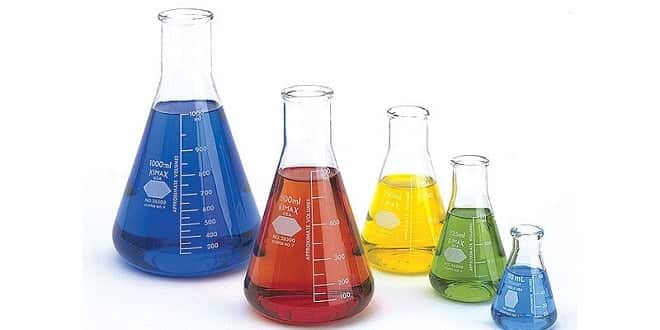Genel Kimya
-

Effect of Temperature on Equilibrium ( Dr. Bülent BELİBAĞLI )
3. Effect of Temperature on Equilibrium The equilibrium constant is temperature dependent. • For an endothermic reaction, DH > 0 and heat can be considered as a reactant. • For an exothermic reaction, DH < 0 and heat can be considered as a product. a. Raising the temperature of an equilibrium mixture shifts the equilibrium condition in the direction of the endothermic reaction. b. Lowering the temperature of an equilibrium mixture shifts the equilibrium condition in the direction of the exothermic reaction. …
-

Acids and Bases ( Dr. Bülent BELİBAĞLI )
Characteristics of an acid: 1. It turns blue litmus paper to red 2. It tastes sour. Try drinking lemon juice (citric acid) 3. Corrode metals 4. Reacts with bases to form salts and water Characteristics of a Base: 1. A bitter taste. 2. It feels slippery. (Soapy Water) 3. It turns red litmus to blue. 4. Reacts with acids to form salts and water Arrhenius Theory: According to this theory an acid (HA) is a substance that breaks into H+ ions in an aqueous solution. A Base (MOH) is a…
-

Ions as Acids and Bases ( Dr. Bülent BELİBAĞLI )
The stronger the H-A bond, the weaker the acid should be. The strong bonds are characterized by short bond lengths and high bond dissociation energies. Example: 50 mL of 0.0155 M HI(aq) is mixed with 75 mL of 0.0106 M KOH(aq). What is the pH of the final solution ? …
-

Spontaneous Change: Entropy and Free Energy ( Dr. Bülent BELİBAĞLI )
Spontaneous Change: Entropy and Free Energy Spontaneity: A spontaneous process is a process that occurs in a system left to itself; once started, no action from outside the system (no external actions) is necessary to make the process continue. i.e., the process proceeds on its own without any external influence. A non-spontaneous process will not occur without external action continuously applied. …
-

Standard Free Energy Changes ( Dr. Bülent BELİBAĞLI )
Standard free energy of a substance = f(T, P, state of substance, concentration,…). The Standard free energy change (ΔG⁰) corresponds to reactant’s and product’s free energies in their Standard states. (ΔG⁰) = G⁰products – G⁰reactants The Standard free energy of formation (ΔGf⁰) is the free energy change for a reaction in which a substance in its Standard state is formed from its elements in their most stable forms in their Standard states. Free energies of formation of the elements in their most stable forms at 1 atm pressure is zero. …
-

Chemical Reactions
•In the section entitled “Chemical Reactions” we discussed precipitation and acid/base reactions within a water-based medium (i.e., aqueous solutions). Water is by far the most important solvent for chemical reactions. A high percentage of naturally occurring chemical reactions occur with water as the solvent. Water has several important properties that make it an interesting solvent: In particular we consider its polarity: •We have already seen how the polarity of water affects the solution of ionic compounds. What happens with aqueous solutions of molecular compounds? Two situations arise in this case:…
-

Chemistry Glossary
absolute zero : the lowest possible temperature (-273.15°C). absorption :the process by which a substance is soaked up. acid : a substance that can give a proton to another substance. Acids are compounds, containing hydrogen, that can attack and dissolve many substances. Acids are described as weak or strong, dilute or concentrated, mineral or organic. Example: hydrochloric acid (HCl). An acid in water can react with a base to form a salt and water. acidic solution : a solution with a pH lower than 7. acidity : a general term…
-

EDTA Titrations
EDTA Titrations Introduction 1.) Metal Chelate Complexes Any reagent which reacts with an analyte in a known ratio and with a large equilibrium constant can potentially be used in a titration. Complexation Titrations are based on the reaction of a metal ion with a chemical agent to form a metal-ligand complex. Metal Ligand Metal-Ligand Complex Metal – Lewis Acid or Electron-pair acceptor Ligand – Lewis Base or Electron-pair donor Note: multiple atoms from EDTA are binding Mn2+ EDTA Titrations Introduction 1.) Metal Chelate Complexes Complexation Titrations are essentially a Lewis…






